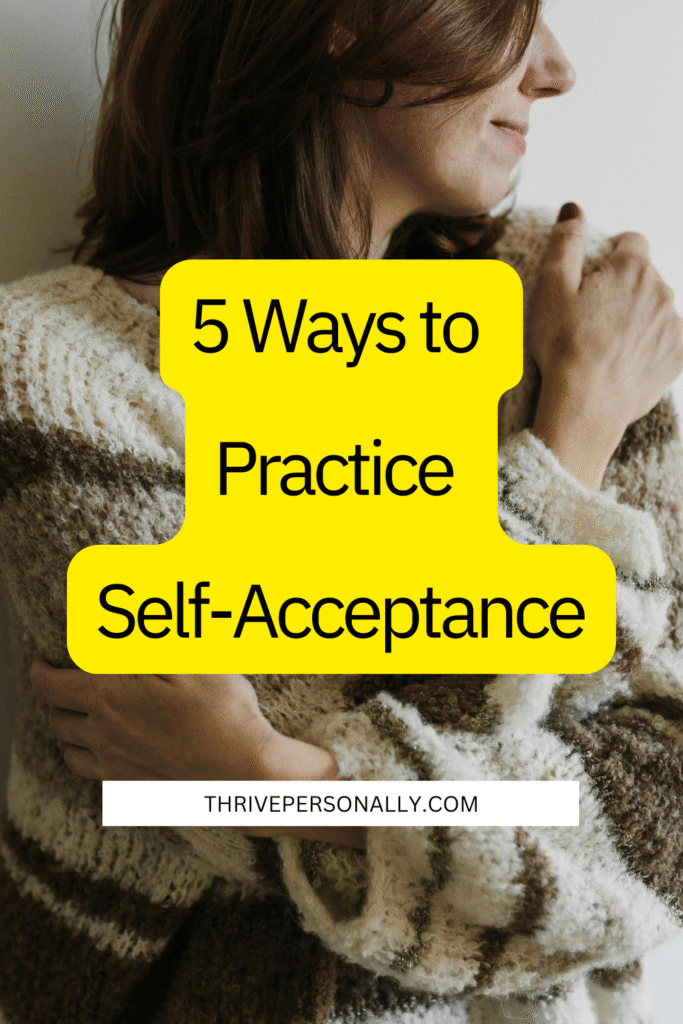It took me years to realize I wasn’t really living. I was just trying to become the version of myself I thought other people wanted. The truth was, I didn’t accept myself. I didn’t feel at home in my own skin. When I finally recognized that, I knew I had to change. I stopped focusing on how I could change myself and began focusing on how I could see myself. That was the start of my journey toward self-acceptance.
Self-acceptance doesn’t mean you ignore your flaws or pretend you have no room for growth. It means seeing yourself as you are and still choosing to value and appreciate yourself. When you do this, you stop fighting against who you are and start enjoying the freedom of being you.
5 Ways to Practice Self-Acceptance
1. Listen to—and Challenge—Your Inner Judge
The first step is noticing the voice in your head that keeps pointing out what’s wrong with you. This voice can be loud and convincing. You may hear it when you make a mistake, feel less than others, or try something new.
Instead of believing everything it says, learn to question it. When a thought like “you always mess things up” appears, ask yourself: Is that really true? Or is this just my reaction to a slip-up?
Over time, you’ll begin to recognize that this inner critic doesn’t always speak the truth—it often speaks from fear and habit. By challenging it, you can separate who you truly are from the negative patterns you’ve learned to repeat to yourself.
For more on how the brain creates these thought patterns, see Verywell Mind on Cognitive Distortions.
2. Show Yourself Compassion When You Fail
It’s easy to be kind to yourself when you’re succeeding. But real self-acceptance is built during the moments you fail, make bad choices, or when life doesn’t go as planned.
Self-compassion means treating yourself as you would a close friend in trouble. Instead of beating yourself up, you offer understanding and support. You accept that you’re human and imperfect—not as an excuse for bad behavior, but as an opportunity to learn without drowning in shame.
When you catch yourself in a difficult moment, try pausing to speak kindly to yourself, even if it feels awkward. You might tell yourself: It’s okay to be wrong; this is how I learn and grow. Over time, this habit will make it easier to feel at home in your own company.
For more on this, explore the work of Dr. Kristin Neff at Self-Compassion.org.
3. Accept All Parts of Yourself—Even the Ones You Don’t Like
It’s easy to value the traits you love about yourself—like creativity, humor, or kindness—but harder to accept the traits you see as weaknesses, such as insecurity or impatience.
Self-acceptance means recognizing you are a mix of many qualities, and that’s okay. This doesn’t mean you stop improving yourself—it means you stop fighting your humanity. You can acknowledge weaknesses without shame, knowing everyone has them.
You might even say to a friend: Yes, I feel anxious sometimes, but that doesn’t make me less deserving of love or respect.
When you accept yourself as a whole, your emotions become steadier. You no longer swing between pride and shame depending on whether you “do well” or “mess up.” Instead, you feel grounded, no matter which side of yourself shows up.
Read also: How to Accept Compliments Without Feeling Awkward or Shy
4. Let Go of Unfair Comparisons
Comparing yourself to others is one of the quickest ways to lose self-worth. You might measure yourself against someone’s achievements, lifestyle, or appearance and feel behind. But no two lives have the same opportunities, challenges, or circumstances—so there’s no such thing as a fair comparison.
When you catch yourself comparing, shift your focus inward. Ask: Where was I a year ago? How have I grown? This keeps you on your own path instead of someone else’s.
Also, remember that most people—especially online—share only their best moments. What you see is rarely the full truth.
For more insights, read The Comparison Trap from Psychology Today.
Read also: 51 Self-Care Weekend-ideas
5. Live by What You Believe
One of the most powerful ways to grow self-acceptance is to live according to your values. This means making decisions based on what matters most to you—not just on what earns approval from others.
When your actions align with your values, you feel more confident because you’re living with integrity. You no longer need as much external validation—you know you’re living in a way that feels right to you.
To start, spend time reflecting on what matters most in your life. Is it kindness? Honesty? Joy? Then let those values guide your daily actions, even in small ways. Over time, this deepens your confidence and makes self-acceptance more natural.
The Ongoing Choice of Self-Acceptance
Self-acceptance isn’t something you choose once and never think about again. It’s a practice you return to, especially on hard days. There will still be moments you doubt yourself or wish you were different.
But the more you show up for yourself—with honesty, kindness, and understanding—the more you’ll see that you don’t need to be perfect to be worthy of love and respect.
When you finally learn to accept yourself, life stops feeling like a constant struggle. You can let go of the masks and the need to hide. You’ll discover you are enough, exactly as you are.
Save the pin for later



